Karakol Valley Trek: 4 Seasons in 3 Days
15 August, 2008, 03:30 am in "Kyrgyzstan"
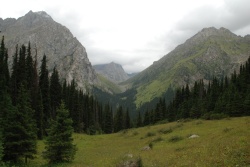 At first we were going to do the trek ourselves. Then we ran into a tourist who had tried it but had been unable to find the trail over the pass and eventually had to give up and turn back. Since neither of us are experienced trekkers, we decided to get a guide. At CBT we were told another couple was interested in the same trek so we could share costs. Later, we met with Sylvie and Florent from France, as well as our guide, Kasedin. We were then sold on a couple porters, since they said we'd have to each carry 10K of food along with our stuff, the pass was difficult, and tourists without porters walked too slow. Florent was a vegetarian and since we were all a bit burnt out on meat, we requested vegetarian meals to the dismay of the guide.
At first we were going to do the trek ourselves. Then we ran into a tourist who had tried it but had been unable to find the trail over the pass and eventually had to give up and turn back. Since neither of us are experienced trekkers, we decided to get a guide. At CBT we were told another couple was interested in the same trek so we could share costs. Later, we met with Sylvie and Florent from France, as well as our guide, Kasedin. We were then sold on a couple porters, since they said we'd have to each carry 10K of food along with our stuff, the pass was difficult, and tourists without porters walked too slow. Florent was a vegetarian and since we were all a bit burnt out on meat, we requested vegetarian meals to the dismay of the guide. The next morning we were all there early. Shopping bags of food covered the table. I could see vegetables, fruit, bread, and lots of candy and chocolate. We met our porters, Nurik and Milan. The van showed up, and our packs as well as the bags of food were thrown in the back. We stopped at the Guides Association which was the company the guides and porters worked for. "I hope they are getting some hiking boots," I said, noting one of the porters was wearing flip flops. They came out with big backpacks but still in flip flops, loaded their bags in to the van and we drove out of town towards the mountains. It was a gray overcast day-- not the prettiest day to start a trek-- but at least we wouldn't be too hot.
The van dropped us off near a bridge. The food bags were piled on the ground along with the porter's bags. Kas told us we'd start and the porters would catch up.
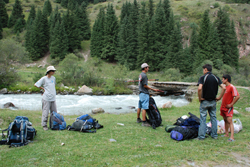
The hike was a pretty walk along the valley floor. We'd noticed some of the leaves turning yellow as we drove through the valley. Although it was still early August, the gray and occasional drizzle made it seem like autumn. The river rushed along next to us. Even against the gray skies, the slopes of the mountains, with their rocky tops like teeth and smooth green cloaks of grass below looked impressive. The lower slopes were covered with orderly cone shaped fir trees looking like the caps of armies of gnomes descending upon the valley.
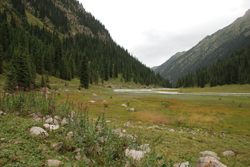
When the porters caught up, dressed in tennis shoes, Kas boiled water, they made a salad and set the spread for lunch. I guess to replace the meat food group they opted for the chocolate food group. The mat had a pile of colorfully wrapped candies, a big bar of white chocolate, and a container of chocolate hazelnut spread. They also had raisins, dried apricots and walnuts, bread pieces, frosted crackers, and iced cookies. The whole thing made me think of an office Christmas party. They added some melon slices and poured some tea. After lunch, we walked a bit further until we came to another bridge. We crossed the bridge and started hiking up the hill.
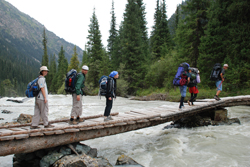
The first part was through pine forest. The earth was soft, made up of decomposed pine needles. Delicate flowers bloomed.
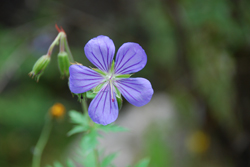
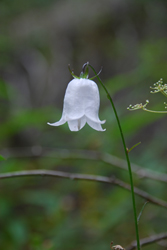
Up the slope, the trees thinned out and soon we were walking across crumbled pieces of rock, the fallen sheets of mountain. This was where the climbing to 3000 meters above sea level occurred. We climbed-- stopping occasionally to rest and admire the view of the valley and river winding off behind us.
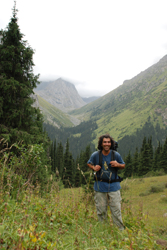
Now especially, I was glad of the cloud cover. Towards evening, we reached a small blue-green lake. A little farther was the campsite.
Kas, Milan and Nurik prepared dinner while the rest of us were setting up our tents. Then we had tea and talked a bit.
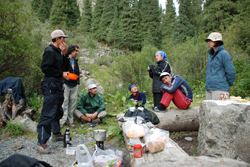
Kas had grown up in the mountains and spent summers accompanying his father on hunting trips. He had started working as a guide at 16 and had completed the 3 year guide school program in Karakol, the only school of its kind in Kyrgyzstan. He said it was hard when he was 16 because people wouldn't take him seriously and didn't think he could know the route. At 20, he said, things were a lot better. Though still young looking, he had the look of experience in his eyes and a certain quality of hardness to his skin as if he had been weathered slightly.
Nurik, who also speaks English, is a bit over qualified for porter work. He has a degree in mining and a job that pays more than a guide makes. Kas tells him he should become a guide but Nurik insists his current job pays better and he just enjoys going to the mountains with Kas on his days off. He boxes so the physical activity of carrying heavy bags is part of his work out. He mentioned that he enjoyed being a porter for small groups because in large groups the porters eat separated from the tourists. He felt in large groups, the tourists acted like the porters were just donkeys and never talk to them. "Maybe it is because they don't think we know English." He explained when he works as a porter in a large group, he ends up talking to hikers from small groups he meets on the path. Milan is a wrestler and I think he really enjoys hauling heavy weights around, seeing it more as a challenge than work. Nurik was originally from Jalalabad and the guys made fun of him about it. He explained the N. Kyrgyz don't like the S. Kyrgyz and that the president is from the South and favors them by giving them more technology including computer gifts given to the whole country by Japan. He explained the South were more conservative.
I can't remember who brought up the idea that someday Kyrgyzstan would cease to exist and end up split between China and Kazakhstan. The North Kyrgyz like the South Kazakhs. I think it was Kas who said he hoped Kyrgyzstan would become part of Kazakhstan.
The campsite had a small hut with stove (K had said it was good to have access to it in case of rain.) There were several stumps and some trees with faces carved into them giving the area a strange pagan appearance, though trash left by other groups somewhat detracted from that.
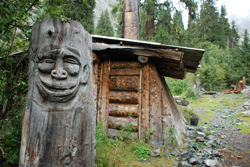
The river roared and the trees were silent. I was glad to see our guide and porters were attentive to gathering our trash into a bag after each meal, not letting even a candy wrapper escape their attention.
After the day's hiking, I eagerly dived into the chocolate food group. Kas prepared delicious plov--even better when we added walnuts and raisins.
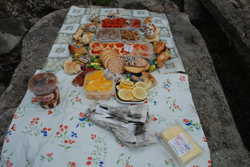
At dinner, Rowshan spotted some wildlife.
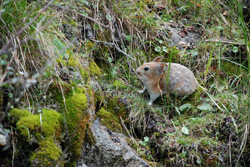
Later, Rowshan and one of the guys, started a fire. Florent and Rowshan gathered rocks to make benches but as soon as they got everything set up and comfortable, it started raining hard enough to force us to retire to our tents. The night was cold and we could hear first rain on our tent and then the sound of the water dripping from the tree branches.
Breakfast was hot soup-- a welcome hand-warmer to cut through the cold of the morning. We packed our tents and as we waited, the rain started in a cold drizzle squeezed from dishrag clouds. "The weather couldn't be worse for hiking," Rowshan said. "Yes it could," I replied. "It could be colder and be heavy sleet with an icy wind."
Kas and our group set out. We briefly walked through a forest glen and soon started climbing the rocky mountainside along the river. The rain continued and the air got colder as additional chilly gusts of wind whipped our rain gear drenching our light summer clothing underneath.
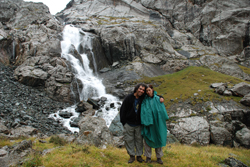
Hiking was far from pleasant so I let my mind wander to the book Fellowship of the Ring and thought about Frodo Baggins, Sam and Pippen hiking through the cold rain when they were used to comfort and 5 meals a day. "This isn't that bad," I told myself. "At least there are no Ring Wraiths after us." Of course, one can only find limited comfort when comparing oneself to characters in fantasy novels. We reached the lake, Ala Kol: a bright turquoise against gray mountains draped with scarves of rubble from previous rock slides.
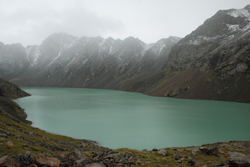
As we walked along the mountainside, which rose from the waters of the lake, we could hear the occasional crash of rocks breaking and falling into it. It seemed like an ominous lake which was hiding something. The wind swirled the waters strangely. Due to the weather, we did not stay long, choosing instead to press on up the mountainside. Soon we would start the ascent up to the Ala-Kol Pass. The pass, at 3860 meters, had already begun to take on an air of dread: "The hardest part of the trek".
The rain continued. We looked up, noticing the rocky slopes had a light dusting of snow, perhaps from the night before. It was a hard climb made harder by the rain soaking the unstable slippery rocks.
As we ascended, the rain seemed to lighten. Soon we saw it had become snow--light spots melting into slush on the ground. Then they got heavier. Before we knew it huge clumps of snow were drifting from the sky. At first we welcomed the relief from the cold rain. At least the snow just drifted off our clothing--not drenching us.
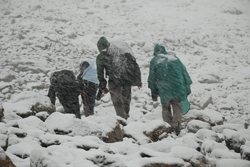
By this time the porters had sped on ahead. At one point we saw them running up the path far ahead. The air continued to get colder and the snow heavier. It had also managed to start sticking and melting on our clothing. A bitter wind blew against the mountainside. The peaks we'd seen somehow disappeared and were replaced by white haze. We briefly could just make out the shapes of Nurik and Milan with their huge bags and someone else seeming to drop vertically, but in reality probably just climbing down a steep slope. Then they all disappeared.
We couldn't see the pass. We couldn't see the mountain tops. Cold and wet we just hurried after Kas, trying not to slip. Occasionally, one of us stumbled and landed, bracing ourselves, in the snow. It was during one of these moments I realized how cold my hands were. I began walking with my arms hugging my body, hands under my armpits, trying to get them to be warm. Thoughts of true life episodes from TV shows about naive tourists stuck on mountains, nearly frozen to death in freak snow storms began to cross my mind. I began to be grateful we had Kas who was experienced leading us. He was always ahead but would often turn to make sure we were all there. He was guiding us on the trail, I think, but even when I searched, I only was able to find one marker. All the others had been lost in a coat of snow.
Ala Kol Pass in August
My upper arms felt prickly like someone was rolling cactus pieces on them. I rubbed them and it made the prickly sensation lighted. I had been in much colder weather but I'd never been so terribly unprepared--summer pants, T-shirt, fleece, Gortex shell, rain poncho. We were all dressed like this.
Finally we reached the summit, marked by a pyramid of stones. I crouched behind it, slowly moving around it trying to position myself so it blocked the wind. The others joined me trying to crouch behind the insignificant amount of protection offered by the stone pyramid. Sylvie voiced our thoughts, "I'm so tired!"
Kas firmly answered, "We have to go on. We can't stop here. You are too cold." This was the first time Kas didn't let us take a break when we wanted to. This change in behavior seemed to hint we were in a dangerous place and he wanted us to be out of it. I asked him where the closest shelter was. He replied, "4 hours away. But Nurik and Milan have gone ahead and set up a tend with the stove inside so we can get warm there." He said we'd reach there in half an hour. Everyone got up and followed Kas along the ridge a little before he began breaking a trail through the snow down the opposite side of the pass. To our relief, the wind died down.
We quickly descended, sliding along the slippery mix of mud and snow. We were relieved to find the air warming a little though we were still desperately cold. But we knew the worst was over. We even joked about cutting the travel time in half by sliding down the mountain on our butts. As we continued descending, the snow dissipated. The sky seemed to become lighter and the layers of snow: thinner and thinner until we were walking on slushy mud.
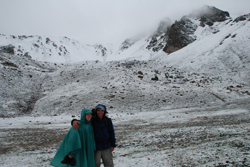
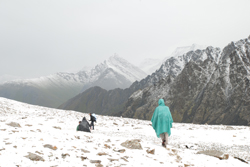
Then we began to see blades of grass coated with melting snow and delicate purple flowers coated with ice and looking like the first flowers of spring.
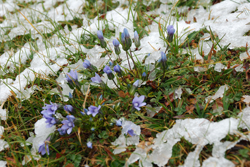
The snow disappeared entirely and we were walking on green grass. We could look behind us at snow covered slopes and ahead to beautiful snow capped mountains and bare stone crests like teeth against the slowly clearing sky.
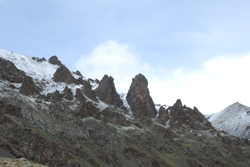
But we were far from them. We were on the still green slopes of springtime. Streams trickled by. Down a slope and over a small river, we came to the tent. Nurik and Milan had draped their jackets and outer clothing on the tent and rocks to dry. They invited us in the tent, warmed by the stove, where they made tea and brought us a bag of potato chips which tasted delicious. We had lunch in the tent, then sat outside trying to dry our socks and rain gear. The faintest trace of blue broke through the clouds above.
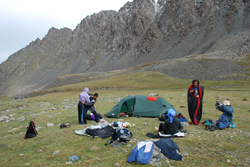
After lunch, Kass led us onwards while Nurik and Milan packed up the tent and food. We were amazed by the contrast in environment.
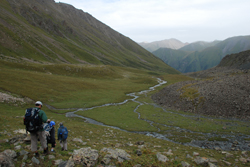
Walking down a steep hill, I suddenly heard a cry of pain behind me. I turned to see Sylvie on the ground grasping her ankle and moaning in pain. Kas rushed to her pulling a bandage and some salve from the top of his bag. He checked her ankle and established it wasn't broken but Sylvie was in extreme pain and thought it was probably sprained. Florent poured cold water on it and then Sylvie rubbed in the salve Kas had given her. Kas wrapped her ankle but we all knew there was no way she could walk. "Wait here. I'm going to get Nurik and Milan. I'll be right back." Kass set off running back up the hill. A little later, he returned and pulled out a rope and began coiling it around his foot and knee. Then he wrapped the coil around the middle and pulled the rope tight. He then wrapped a sleeping mat around the center and tied it in place. A short time later, Nurik and Milan showed up at a run with their huge bags. Kas explained that he and Nurik, who were about the same height, would carry Sylvie. Milan would take a lot of the heavy items from their bags and go on ahead with Rowshan and I. They began redistributing the weight from their bags. Florent took most of the contents of Sylvie's bag. Milan took a huge load of items from Nurik and Milan's bags as well as Sylvie's backpack. Rowshan took a small bag of canned food but they wouldn't give us anything else even when we begged them to. Milan set off and Rowshan and I followed. We turned back and saw Nurik and Kas placing Sylvie on the swing they'd made, each looping a coil of rope over one shoulder and holding her between.
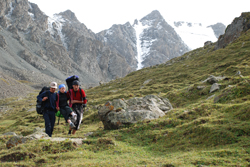
We went along at a good pace.
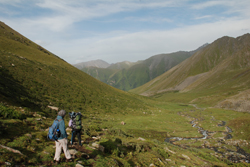
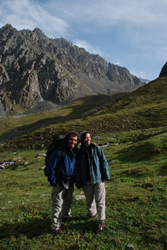
Sometimes we saw reddish marmots sitting on rocks though more often we just heard them whistling. As we descended, we passed horses grazing on the mountains side.
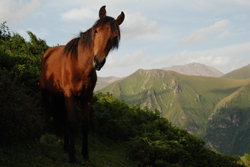
Upon reaching the base of the valley, we crossed a wide but shallow river on stepping stones and proceeded along the valley floor following the river.
We somehow had reached a pastoral paradise. The valley sides were lush green. Brown and white sheep speckled the slopes.
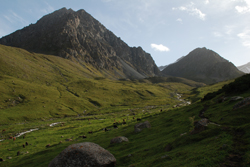
Horses galloped across the pasture and down to the river. The harshness of the rocky slopes above seemed to be magically dissolved into green velvet.
We passed a shepherd riding a horse and knew we were getting closer to "civilization". We continued walking, sometimes by the river, sometimes through serene pine groves.
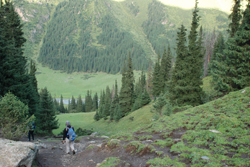
The sun shone through the clouds which eventually dissolved into blue. In the distance, perfect snow capped peaks nestled between layers of gray rocky mountains.
In the pine forested area we came upon a boy gathering wood on a horse. Milan eagerly told him about the day's events. He spoke in Kyrgyz but the meaning was obvious in his excited vocal emphasis. Rowshan pulled out the camera which had a video of the snow on it. The boy looked at it in amazement. Kas had said they don't have snow storms in August and judging from the boy's reaction, this was true.
We passed by another shepherd's household where their herd of goats were gleefully climbing a huge rock outcropping as if it were their own personal mountain.
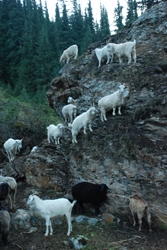
Milan repeated the story and I showed the video to the woman who was sitting in front of the house.
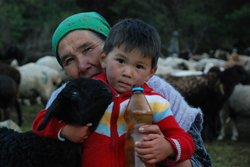
It was getting to be towards sunset and the animals were being moved towards home. Although the landscape was beautiful, I was ready for dinner and sleep. Finally, Milan pointed out some small cottages ahead. I could see a field of tents next to one house. We'd reached Altyn Arashan, the "health resort" and home to the Altyn Arashan hot springs. In reality, it is just a few houses and a few small wooden buildings housing concrete pools where the sulfurous water is piped in.
We all decided to stay in the guest house-- a small wooden house, half of which was occupied by the family and the other 2 rooms were left for guests. The house had a wooden outhouse was out back and no electricity. But, we rejoiced at the idea of being warm behind a wall and under several blankets instead of in the camping area, exposed to a cold wind. A little after we arrived, we saw Nurik, Kas and Florent walking a little ways behind Sylvie mounted on a horse. The shepherd we had seen earlier was leading the horse. He was accompanied by the boy we'd seen gathering wood.
At dinner, I think it was Rowshan who asked the guys how they all got to know one another. Kas said Milan was from the same village as him but they didn't become friends until 5 years ago. Kas said his wife was in a class with a bunch of guys in a school in Karakol. He didn't say exactly what happened but I assume one insulted his wife or something. Kas said he had to go to Karakol to fight. Nurik was one of the guys in the class but insisted he hadn't been there that day. While Kas was headed to Karakol, he ran into Milan and told him he had to go fight. Milan, being a wrestler, was into the idea and said, "OK lets go!" Milan was friends with Nurik and said "Why are you going to fight with Kas?" He persuaded Nurik to join their side and the boxer, wrestler and Kas went off to fight in Karakol. They didn't say how the fight went but the important thing is from then on they all became friends. Kas said Karakol is a town of fights since so many people from different villages end up there.
It was hard to leave Arashan in the morning. The river was the color of lichen frosted with rapids. It ran through the valley with its soft hills climbing to jagged mountains. Crowning the valley is the dual peak of Palataka, the suitably named "Tent" mountain, which was completely white from the new snow and sparkled against the deep blue sky.
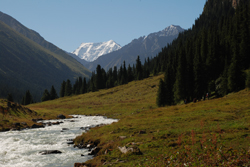
The valley begs for relaxation. The sun was gentle through the air was brisk. Sheep milled around the house. Shepherds carefully filled in the gaps, between the wood pieces making up the bridge, with stones. Then they herded the sheep onto the bridge, closing off the ends with gates to make a pen. They were vaccinating them.
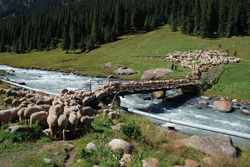
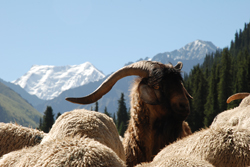
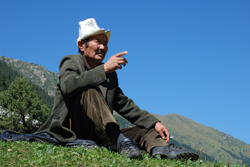
Sylvie, Florent, and Kas took a car back to town while Nurik, Milan, Rowshan and I walked. Milan, bearing just a regular amount of weight in his backpack seemed to find his load almost too light. The sun was hot and I got a little sunburned. The path followed the river.
Purple, yellow, and orange flowers dotted the grass next to the path and butterflies flickered like flower petals tossed by a capricious breeze.
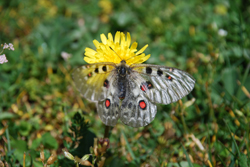
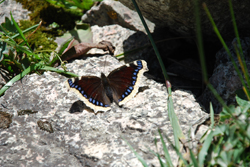
It was hard to believe that 24 hours before we'd been trekking through a snowstorm.
Karakol: Mountains, Trekkers and Fat Ass Sheep
11 August, 2008, 03:30 am in "Kyrgyzstan"
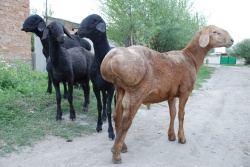 We shared a taxi to Karakol with a couple from England who had biked from Denmark to Russia then taken a train across Kazakhstan to Almaty (biking across miles and miles of Kazakh desert in July=NOT FUN). Then they had biked to Karakol and had originally planned to go across China but all the land borders are closed because of the Olympics and they've stopped granting visas.
We shared a taxi to Karakol with a couple from England who had biked from Denmark to Russia then taken a train across Kazakhstan to Almaty (biking across miles and miles of Kazakh desert in July=NOT FUN). Then they had biked to Karakol and had originally planned to go across China but all the land borders are closed because of the Olympics and they've stopped granting visas. The ride to Karakol followed along the lake side. The mountains continued to be hidden in haze. We passed some interesting red rock formations and the area seemed to become a little greener.
Karakol is in from the lake a little. It looks like a fairly unexciting town--concrete brick center, with some stores, cafes and a few trekking agencies. There are supposedly mountains but it is so hazy that all we could see was fuzzy shadows.
The houses are Russian colonial style which adds a bit of architectural interest in their wood trim design. There is also a pretty Russian Orthodox church made of wood. It was unfortunately closed. A few blocks out of the center, the atmosphere got more tranquil with tall pines and other trees shading the street. Beyond the avenue of trees, we could see hills and the faint brightness of snow in the distance.
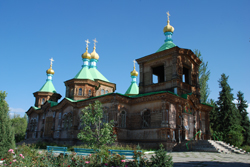
Although we arrived too late for the famous Karakol animal market, we did see some specimens of the amazing Karakol livestock, namely the Kyrgyz fat-ass sheep (our name, not the official one). These sheep (LP refers to them politely as "fat tail" sheep) look like they have an extra butt growing off of where a regular sheep's butt would be. The fat from this area is apparently prized.
The mountains were slightly more visible this morning. While in the center of town, we saw the Russian Orthodox Church was open. Inside it was white and sky blue with gold stars painted on the ceiling of the main dome (the other domes weren't visible from the interior main room). Then we visited the mosque, a Chinese mosque with wooden pillars and ornate wood carvings running from pillar to pillar and under the eves. Since it was prayer time, we didn't go in.
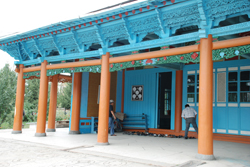
Finally, at sunset, I looked out of the window and saw the mountain tops clearly shining purple against a pink sky with touches of gold from the sun. We rushed out but due to unfortunate placements of telephone wires, walls, houses, and ends of streets, we couldn't get a photo until the sun had almost disappeared.
Manjily: Eagles on Issyk Kol
8 August, 2008, 03:30 am in "Kyrgyzstan"
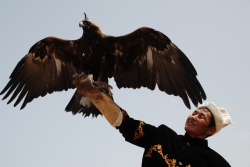 We left Bishkek around noon in a minibus. While at the bus station we had lots of time to people watch and thought these guys looked like gangsters.
We left Bishkek around noon in a minibus. While at the bus station we had lots of time to people watch and thought these guys looked like gangsters.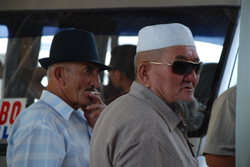
The road was decent and there were lots of irrigated fields-- green where the rest of the landscape was yellow and brown. Before we started, an older man wearing a traditional Kyrgyz felt hat, his daughter and and his granddaughter sat behind us. Rowshan was taking the little girl's photo and showing it to her. She was delighted and laughed.
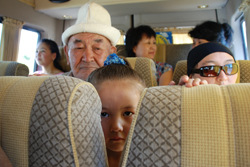
The grandfather asked where we were from. I said the USA. Before even asking our names, he invited us to his house in Bokonbaev. I explained we were grateful but already had reservations elsewhere. His daughter reconfirmed the invitation and said if we go through Bokonbaev on our way back to call.
Not far from Bishkek, the driver stopped by a market where the main product was large watermelons. Several women returned to the van carrying huge watermelons (one was 16 Kilos).
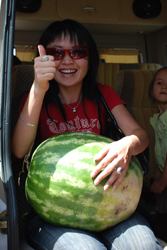
I dozed off for a few minutes and when I woke up we were in the mountains-- jagged and rocky with tufts of dry grass.
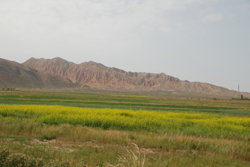
A small rapid river foamed next to the road. The mountains were grayish with occasional outcrops of red rock, eroded into finger-like walls and ropey waves.
There were only 3 other guests at the yurt camp. Briony, Rob and Dominique were participating in a car rally for charity where everyone drove a car from England, Spain, or Italy to Ulan Batar, Mongolia, by the route of their choice. Some took a northern route through Russia, others went through Turkey, Iran and Tajikistan. They went through Russia, Kazakhstan, Kyrgyzstan, then were heading back into Kazakhstan, into Russia, then to Mongolia. They had been driving for about 10 days straight and had their first real break here in Manjily, where they'd spent a day lying on the beach at the lake and gotten a bit too much sun.
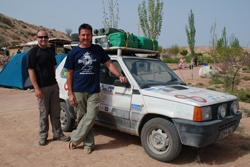
The camp had a view through the owner's rather sparse experimental apricot orchard, across reddish gray sand and dirt speckled with scrubby green brush. The lake, a soft blue that blended into the sky was so large, I couldn't see the opposite shore. The view of dryness, softened by water made me think of Baja without cacti. Behind the yurt camp rose variegated clay hills and beyond that, the mountains with scrubby heads of pine trees.
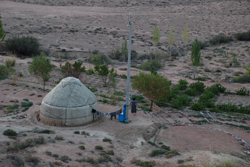
We were served tea and dinner. The plov was quite good--not greasy like all the other plov we've had. We also had salad and nice bread. Towards the evening, as I was relaxing in the yurt, I heard the sound of a sheep. The our fellow guests reconfirmed it was a sheep that had been pulled out of the trunk of a car after bunches of other groceries and beer had been produced. It was presumably the meals for the next few days. We were all relieved that we weren't invited to witness the sheep's final moments.
After dinner, the women busied themselves in the kitchen preparing little fried bread pieces. Rowshan discovered the grandmother understood some Turkish so he was soon chatting with them.
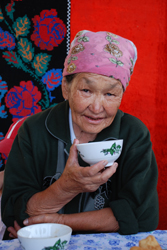
A little later, they dumped piles of fresh fried dough pieces on the table. Hot, fresh out of the fryer, they were delicious. Rowshan had been presented with the first one. We all tried to go to bed early but a little after we turned off the light, a group came from Bishkek talking and laughing late into the night. They were up around 6AM in the morning, practicing. Food was being prepared and occasionally a car would pull up and 2 to 4 tourists would pop out. By the end of breakfast, the long table was almost full. The girls from Bishkek sang some songs and did some dances. Baykut, the owner of the yurt camp, told us about the history and legends of the region. Then we set off into the hills for a walk by several sacred springs. The first couple were small, leaving traces of heavier green amongst the gray rocks. We continued up and down hills until ahead of us we saw a large tree with leaf filled branches.
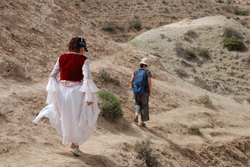
This was the strongest spring and it created a miniature oasis. A broad tree created a shady paradise. Lush green grass covered the ground. A family was having a picnic. Being a bit wary of springs, we didn't drink from it choosing our bottled water instead.
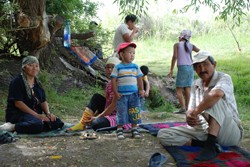
Back at the camp, we had another concert. By this time, a sound system had been brought in and several people performed on the komuz, the 3 stringed national instrument of Kyrgyzstan. The performances were very good. One woman played it with strange fluttering motions to express the conversation of birds.
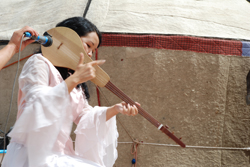
The dances as a group were a bit disorganized, but the individual dancers' movements were graceful with lots of delicate hand gestures.
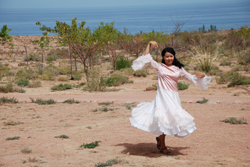
We had a huge lunch feast.
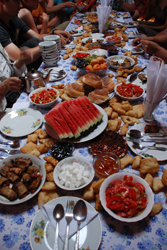
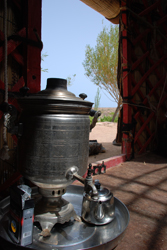
Afterwards, the highlight of the day began to show up: 3 eagle hunters (burkutchu) and their eagles. The men were dressed in matching brown velvet with gold swirl designs and traditional white felt hat.
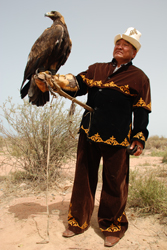
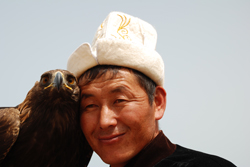
They each had a giant golden eagle who perched on their heavy leather gloves, iron talons curled.
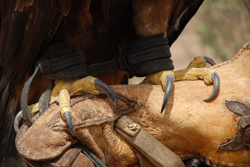
They were very elegant and dignified men of different ages. For the demonstration, they ceremoniously marched up a hill with eagles on their arms, while a man with a bag of rabbits walked out to the field below.
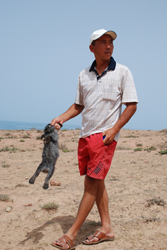
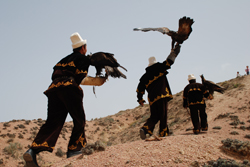
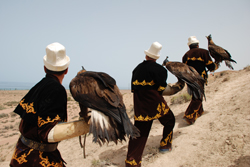
The first eagle was told to fly. She outstretched her wings and soared down directly at the rabbit, slamming it to earth.
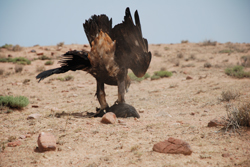
The eagle hunter went racing to his eagle. The 2nd rabbit and 2nd eagle followed. then the 3rd. After the 3rd, we all raced down. Each hunter stood by his eagle and determined how much she could eat. The eagles were tearing the guts out snapping veins and inner organs.
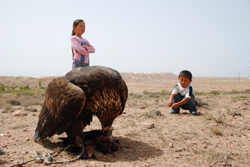
The rabbits were removed and placed back in the bag. We are not sure what happened to them. Then we took turns taking photos with one of the eagles perched on our arms.
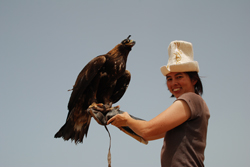
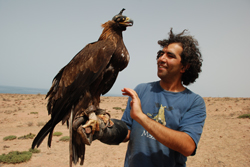
Two of the eagles and hunters left. One eagle remained, masked, by the dining area. Then we had free time which some of us utilized by taking a trip to the beach. It was crowded and there was a lot of trash, however one of the foreigners, a man from Switzerland, said he had swum in the morning and not only was the beach empty, it had been clean. The water was beautiful--clear but not too cold. By this time the sun wasn't too hot either. We relaxed on the beach with several other people we met visiting Manjily for the Birds of Prey festival. Then we headed back to the camp for tea with the family.
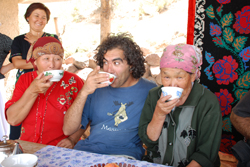
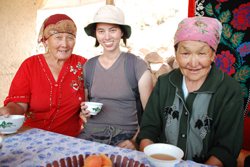
Before dinner we had an additional treat of a professional komuz performer, playing a mini concert. He played the bird song with fabulous bird motions and taps with one of the "birds" eventually flying away. The music of the komuz is surprisingly rich for its few strings.
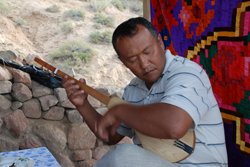
Dinner and some more performances (Rowshan and I heard from a distance since we took a walk at sunset to see the graveyard, eventually getting distracted by a wild jack rabbit fleeing through the desert.) Then the DJ music was blasted until the electricity died. They changed the entertainment to games and we fled up a hillside where some of the other foreigners had already escaped.
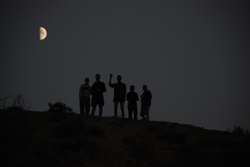
As it got dark, they built a fire and we came down. The electricity came on to my disappointment because I thought the disco had been canceled and we would be able to go to sleep. Instead, the music seemed to be doomed to blast into the night, disturbing the serenity of watching the stars through the ceiling cross beams of the yurt. Rowshan was impressed how the dancers imitated dances from video clips.
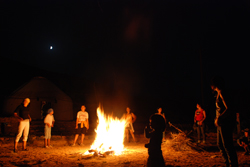
The yurts were quite comfortable. When the top is open, the wooden cross pieces seem to frame the sky. There is a decorative piece above the door which makes a path to the cross piece-- a kind of ladder to the sky. The bottom is lined with felt carpets. The wooden frame also serves as hooks to hang things on or tie things to. A felt piece can be pulled over the top hole when it rains by pulling a rope. It is quite a feat of practical engineering. Everything has its purpose but is also decorative. The door flap-- a piece of felt with a reed mat inside, roles up and tucks into a flap of felt formed by the roof felt.
Powered by My Blog 1.69. Copyright 2003-2006 FuzzyMonkey.net.
Created by the scripting wizards at FuzzyMonkey.net..
(Code modified by Rowshan Dowlatabadi)
Created by the scripting wizards at FuzzyMonkey.net..
(Code modified by Rowshan Dowlatabadi)

